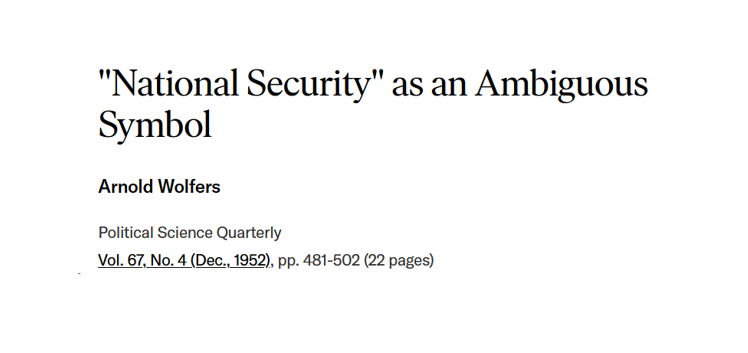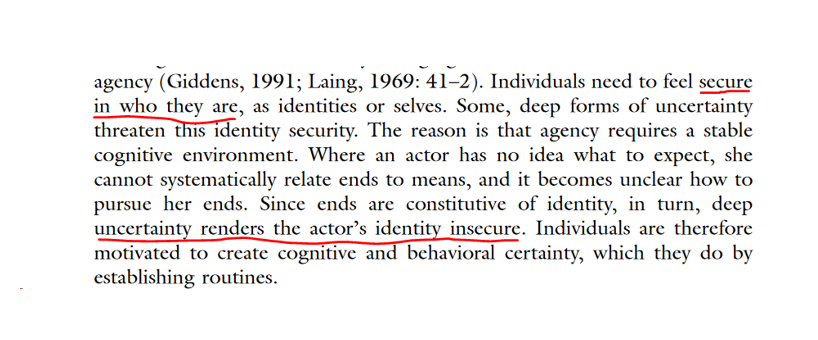Thread
What is "Ontological Security" and what does it have to do with Russia's invasion of Ukraine?
Pretty much everything.
[THREAD]
Pretty much everything.
[THREAD]
Before bringing in the "Ontological" part of "Ontological Security", what exactly is "security" in international relations? 🤔
In the traditional sense, security is "survival". But survival of what?
It could be survival of "the state".
www.amazon.com/Theory-International-Politics-Kenneth-Waltz/dp/1577666704
www.amazon.com/Theory-International-Politics-Kenneth-Waltz/dp/1577666704
The problem with a "state existence" view of "survival" is that "State Death", though a problem when it does happen, is very rare.
www.amazon.com/State-Death-Geography-Occupation-Annexation/dp/069113460X/ref=sr_1_1?keywords=State+De...
www.amazon.com/State-Death-Geography-Occupation-Annexation/dp/069113460X/ref=sr_1_1?keywords=State+De...
We might instead focus consider survival of the "regime" governing the state, rather than survival of the state itself.
The problem, however, is that while "regime existence" is a reason states can continue fighting a war already started...
journals.sagepub.com/doi/10.1177/0022002700044005001
The problem, however, is that while "regime existence" is a reason states can continue fighting a war already started...
journals.sagepub.com/doi/10.1177/0022002700044005001
...it is only rarely invoked as a reason for the war to start in the first place (though the idea of "diversionary wars" is close to this).
www.amazon.com/Diversionary-War-Domestic-International-Conflict/dp/0804782466/ref=sr_1_1?keywords=Div...
www.amazon.com/Diversionary-War-Domestic-International-Conflict/dp/0804782466/ref=sr_1_1?keywords=Div...
Security can also mean safe from violence and coercion that disrupts the pursuit and use of wealth. More "ability to thrive" than "ability to survive".
www.cambridge.org/core/journals/international-organization/article/abs/anarchy-hierarchy-and-the-vari...
www.cambridge.org/core/journals/international-organization/article/abs/anarchy-hierarchy-and-the-vari...
Though the pursuit of wealth is important and can indeed be used to define "national interests", it can also contribute to the idea of security being VERY ambiguous.
Link:www.jstor.org/stable/2145138
Link:www.jstor.org/stable/2145138
Moreover, focusing on "ability to thrive" seems to eliminate "physical violence" from security discussions.
www.cambridge.org/core/journals/review-of-international-studies/article/abs/why-dont-we-talk-about-vi...
www.cambridge.org/core/journals/review-of-international-studies/article/abs/why-dont-we-talk-about-vi...
Those are the limits of using a "material" basis for defining security as survival. Seems that an alternative conception of "security" is in order? 🤔
That's where the "Ontological" of "Ontological Security" comes in.
That's where the "Ontological" of "Ontological Security" comes in.
As the subtitle of @BrentJSteele1's book indicates, "ontological security" is not about survival of "stuff" but survival of "identity". This is in contrast to "the body" (i.e. physical)
www.amazon.com/Ontological-Security-International-Relations-Self-Identity/dp/0415772761
www.amazon.com/Ontological-Security-International-Relations-Self-Identity/dp/0415772761
As @Simon_the_Pratt discusses, that state "identity" is based on relations with other states.
academic.oup.com/isq/article/61/1/78/2742035
academic.oup.com/isq/article/61/1/78/2742035
What does that exactly mean? A great place to look is @JenniferMitzen's seminal piece on the topic.
journals.sagepub.com/doi/10.1177/1354066106067346
journals.sagepub.com/doi/10.1177/1354066106067346
In that paper, Mitzen points to the individual meaning of ontological security: for people to have meaning in their existence, they need an identity. That identity, in turn, requires some type of predictable environment.
Applied to states, states define themselves according to how they see themselves in relation to other states, be it in their region or globally. Security is about maintaining the global or regional environment that enables that identity.
In a word, ontological security is "attachment".
It is attachment to a certain way of relating to others. This then gives a state a clear vision of itself and how it should relate to others.
That attachment will then lead states to take steps to protect that "certain way"
It is attachment to a certain way of relating to others. This then gives a state a clear vision of itself and how it should relate to others.
That attachment will then lead states to take steps to protect that "certain way"
Having defined "Ontological Security", how is it useful for thinking about Russia and its invasion of Ukraine?
Analysts have long used "Ontological Security" and ideas based in ontological thinking to understand Russia's relationship to its neighbors.
Think of the notion of "pan-slavism" in Russia and how this was used to explain its support of Serbia during the 1914 July Crisis.
www.amazon.com/Emergence-Russian-Panslavism-1856-1870/dp/B000LANYEI
www.amazon.com/Emergence-Russian-Panslavism-1856-1870/dp/B000LANYEI
Or think about the post-Cold War idea of the "near abroad", i.e. how the Russian foreign policy establishment refers to the former Soviet Republics.
www.amazon.com/Near-Abroad-Contest-Ukraine-Caucasus/dp/0190253304
www.amazon.com/Near-Abroad-Contest-Ukraine-Caucasus/dp/0190253304
In both cases, Russia's "identity" is based on its relations to those neighboring states. From an ontological security perspective, this necessitates protecting that identity.
Taken to another level, those relations can lead a state (or a state's leader) to view its identity as necessarily imperial. Hence, security means creating and protecting the empire.
Putin was pretty explicit about this.
www.bbc.com/news/world-europe-61767191
Putin was pretty explicit about this.
www.bbc.com/news/world-europe-61767191
Hence, while a realist frame (such as I discuss in this @ForeignAffairs piece) argues that Russia's actions are driven by a need to dominate its region to ensure physical security...
www.foreignaffairs.com/articles/ukraine/2022-06-15/world-power-and-fear
www.foreignaffairs.com/articles/ukraine/2022-06-15/world-power-and-fear
...an ontological security frame (such as presented in this @RANDCorporation report) would argue that Russia is seeking to dominate its region because its identity is bound up in being imperial towards its neighbors.
www.rand.org/blog/2022/08/understanding-russias-motivations-and-using-them.html
www.rand.org/blog/2022/08/understanding-russias-motivations-and-using-them.html
Make no mistake, work applying ontological security to Russia's behavior long predates the current war (consider this @CarnegieEndow report from 2010).
carnegieendowment.org/2010/11/18/russia-and-search-for-ontological-security-event-3127
carnegieendowment.org/2010/11/18/russia-and-search-for-ontological-security-event-3127
This, combined with that notion that it's really hard to see the "physical threat" posed by Ukraine (even a Ukraine in NATO) to Russia, only underscores how ontological security might be the most useful framing for understanding the Russia's motivations.
www.latimes.com/politics/story/2021-12-19/russia-feels-threatened-by-nato-theres-history-behind-that
www.latimes.com/politics/story/2021-12-19/russia-feels-threatened-by-nato-theres-history-behind-that
In sum, a focus on "physical security" really can't offer a satisfactory explanation for the current war. But a focus on "identity security", namely how Russia (read Putin) views itself in relation to its neighbors, seems to offer a much more plausible explanation.
[END]
[END]
Mentions
There are no mentions of this content so far.

